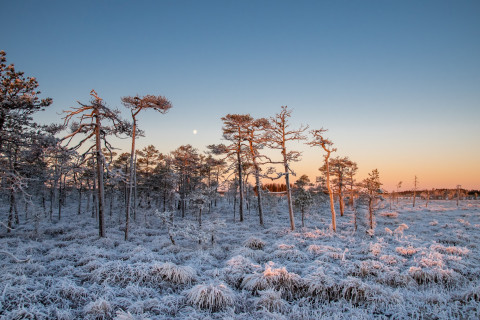The doctoral dissertation in the field of Peatland Ecology will be examined at the Faculty of Science, Forestry and Technology, Joensuu Campus and online.
What is the topic of your doctoral research? Why is it important to study the topic?
Climate change may threaten peatlands, which are one of the characteristic ecosystems of Finnish nature and have a wide distribution in Boreal regions. Peatlands are also key ecosystems for regulating our climate as they contain massive stores of carbon; nearly as much carbon is stored in peat as currently exists in the atmosphere. Climate change is expected to increase global temperatures (particularly in arctic and boreal regions) and increase the occurrence of extreme weather patterns leading to drying in peatlands. However, peatlands are ecosystems controlled by a high water table drying will likely lead to increased carbon dioxide emissions as newly dried peat decomposes. At the same time, specialized plant communities that create the organic matter for peat will likely suffer from deeper water tables. The combined impact of these effects may mean that the carbon-storing role of peatlands my not persist in a future climate. Drying may also cause changes in the specialized peatland plant community and impact landscape-scale biodiversity and habitat structure. The fate of these plant communities is the main research question I aim to answer: do the species change? Do the plants continue to photosynthesize producing material for peat accumulation, or do they become unproductive in a new dry environment? Can peatland plants adapt to drier conditions and become more drought-resistant? By answering these questions, we can better understand the impact of climate change on these globally important systems.
What are the key findings or observations of your doctoral research?
My research shows that specialized peatland plant species are threatened by gradual drying and that the impact of climate change on peatlands may be accelerated by the stress of seasonal droughts. I show that even a moderate (15 cm) drop in water table can cause large and long-term changes in the species found in peatland plant communities. However, this is not true on all peatland types and nutrient-rich fens are the peatland type most likely to undergo changes. In these fens, even slight drying can result in the loss of specialized peatland species as they are replaced by productive upland forest species. In this case, photosynthesis also increases markedly for both individual species and for the whole ecosystem. On the other hand, nutrient-poor bogs resist change and do not change much after a moderate drying. This suggests that peatlands – both fens and bogs – may maintain or potentially increase their function as carbon sinks even in a warming climate. However, climate change threatens sensitive and diverse fens because of species loss and decreased cover of these ecosystems in the landscape.
How can the results of your doctoral research be utilised in practice?
The response of peatland vegetation to climate change is needed by scientists creating models to understand future feedbacks between the biosphere and atmosphere caused by a drier and warmer climate. Processed-based peatland models rely on experimental data, and long-term field experiments are particularly valuable for understanding and predicting the impacts of climate change on our environment.
What are the key research methods and materials used in your doctoral research?
One of the most valuable aspects of my research was the inclusion of a long-term field experiment established in south-central Finland that allowed me to follow changes in peatland vegetation over 17 years after an experimental drainage. This provided a foundation for studying both plant species and their photosynthesis after long-term drying making it an excellent proxy for what we may see following gradual long-term drying following climate change. I was also able to make controlled photosynthesis measurements of individual species grown in different environments, which makes the photosynthesis-related results widely applicable to future research of peatland plant function.
The doctoral dissertation of Nicola A. Kokkonen, MSc, entitled The impact of drying on the structure and photosynthesis of boreal peatland vegetation will be examined at the Faculty of Science, Forestry and Technology, Joensuu Campus. The opponent will be Senior Lecturer Anne D. Bjorkman, University of Gothenburg, and the custos will be Professor Eeva-Stiina Tuittila, University of Eastern Finland. Language of the public defence is English.



